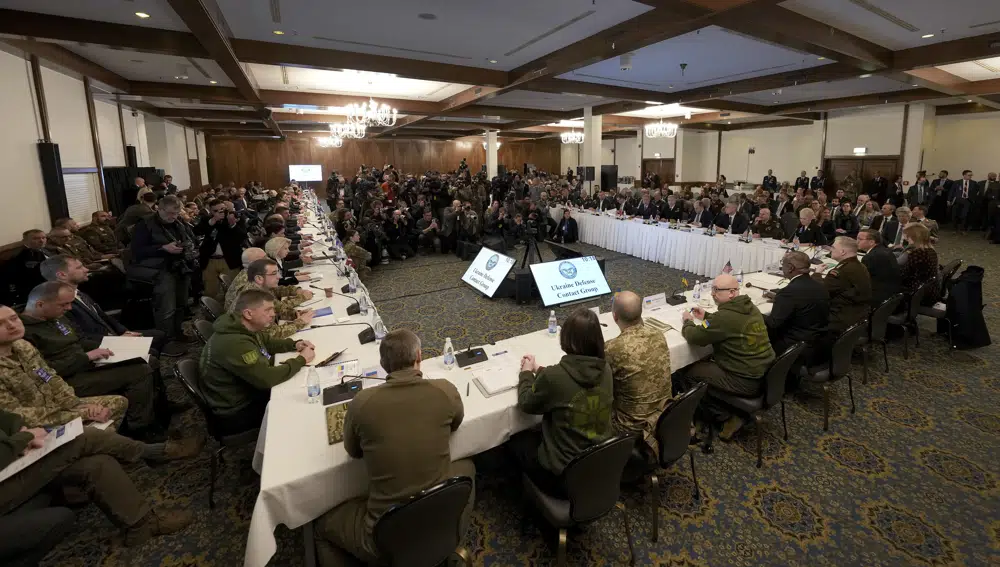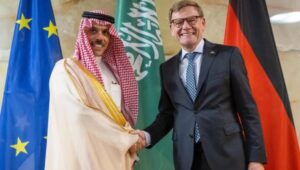Defense leaders gather amid dissent over tanks for Ukraine

Ramstein Air Base, The Gulf Observer: Defense leaders gathered at Ramstein Air Base in Germany heard an impassioned plea for more aid Friday from Ukrainian President Volodymyr Zelenskyy as they struggled to resolve ongoing dissent over who will provide battle tanks and other military aid to his embattled country.
“This is a crucial moment. Russia is regrouping, recruiting and trying to re-equip,” U.S. Defense Secretary Lloyd Austin warned as the meeting opened.
Zelenskyy, speaking live via video link, told the gathering that “terror does not allow for discussion.” He said “the war started by Russia does not allow delays.”
Calling it a decisive moment for Ukraine and a “decisive decade for the world,” Austin said the group’s presence in Germany signaled their unity and commitment to continue supporting Ukraine.
“We need to keep up our momentum and our resolve. We need to dig even deeper,” Austin told the gathering of as many as 50 defense leaders who were attending in person and by video.
Austin and U.S. Army Gen. Mark Milley, chairman of the Joint Chiefs of Staff, were expected to discuss the latest massive package of aid the U.S. is sending, which totals $2.5 billion and includes Stryker armored vehicles for the first time.
But broader hesitation over sending tanks to Ukraine has roiled the coalition. Germany faces mounting pressure to supply Leopard 2 tanks to Kyiv, or at least clear the way for other countries, such as Poland, to deliver the German-made Leopards from their own stocks.
The U.S. has also declined, at least so far, to provide M1 Abrams tanks, citing the extensive and complex maintenance and logistical challenges with the high-tech vehicle. The U.S. believes it would be more productive to send Leopards since many allies have them and Ukrainian troops would only have to get trained on that one, versus needing far more training on the more difficult Abrams.
The United Kingdom announced last week that it would send Challenger 2 tanks, describing it as a natural progression of military aid to Ukraine.
At a Pentagon briefing Thursday, spokeswoman Sabrina Singh said the Leopard and Challenger aren’t comparable to the Abrams tanks because the Abrams is much harder to maintain and wouldn’t be a good fit.
Germany’s new defense minister, Boris Pistorius, who took office just an hour before he met with Austin on Thursday, is among those attending the Ramstein meeting. Referring to the tanks, he told ARD television he was “pretty sure we will get a decision on this in the coming days, but I can’t yet tell you today how it will look.”
During brief comments before the meeting began, Austin said, “we’ll renew our united commitment to support Ukraine’s self-defense for the long haul,” but didn’t mention any specific new equipment.
Nearly 11 months into the Russian invasion, Zelenskyy has expressed frustration about not obtaining enough weaponry from the Western allies.
Under Secretary of Defense for Policy Colin Kahl also said this week that a new phase of the war is shaping up as Russia gets more deeply entrenched, and that Ukraine will need mechanized infantry to break through those lines.
The influx of new weapons, tanks and armored carriers comes as Ukraine faces intense combat in the country’s east around the city of Bakhmut and the nearby salt mining town of Soledar. The battles are expected to intensify in the spring.


